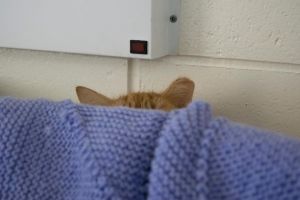Cats seem so chill and even have a reputation for being a bit apathetic, but the phrase “scaredy cat” was coined for a reason. Would you know if your cat was experiencing stress? Where does feline stress come from, and how can you recognize the symptoms? Most importantly, what can you do to help? As veterinarians, we see this fairly often. That's why we wanted to share a bit about cat behavior, including the signs and how to help reduce cat anxiety below.
What is feline stress? Where does it come from?

Feline anxiety can be a serious problem, especially if left untreated. Stress in most species is commonly linked with a suppressed immune system, so just as in humans, a chronically stressed cat can suffer negative health consequences. They may even display undesirable behaviors as well.
Stress manifests itself when the cat anticipates danger—either real or imagined. That means the cause of their stress may not be obvious to us. Some triggers, like the arrival of another pet, a new baby, or a move to a new house can be apparent. Outdoor cats—whether they are neighborhood cats or feral—can be a major source of anxiety for indoor cats. Outdoor cats often engage in a territorial display, threatening indoor cats through windows, and even frequently urine marking doorways. These signals may make an indoor cat feel bullied and can be quite distressing for some cats.
Other potential causes may come from aging, illness, pain, separation anxiety, boredom, or a change in your cat’s normal routine—even new furniture has been a trigger for some kitties. How well your cat handles stressors depends much on their inherent personality or past experiences. A cat with a history of trauma, abuse, neglect, or abandonment can have a particularly difficult time coping with stress.

How to recognize symptoms of feline stress
The onset of symptoms of feline stress can come on gradually, or appear quite suddenly.
Here are some of the most common signs of stress in cats to watch for:
- Inappropriate elimination—either not using the litter box or territorial spraying
- Hiding
- Trembling
- Increased vocalization
- Aggression
- Excessive grooming
- Eating or sucking on fabric or other non-food items
- Less playfulness
- Lethargy
- Restlessness/pacing

Stress can also manifest itself in new medical conditions, or old ones that reactivate. These include:
- Herpes virus infections
- Upper respiratory issues such as discharge from eyes and nose, and/or sneezing
- Feline interstitial cystitis
- Feline lower urinary tract disease
- Skin issues
- Diarrhea
- Vomiting
- Decreased appetite

What can you do to eliminate or at least reduce stress in a cat?
When left untreated, anxiety won’t get better on its own unless the cause of the stress can be removed, and that’s not always possible. In fact, stress is likely to worsen over time. If your cat contracts a stress-related illness, it can lead to additional stress, creating a vicious cycle. Getting to the root of the problem as quickly as possible is preferable over taking a wait-and-see approach.
A first step in resolving anxiety is a trip to see your veterinarian who can assess whether an illness is present, either caused by stress or a result of stress. Once a medical issue has been ruled out or treated, finding ways to help your kitty cope is next.
If a lack of stimulation is the problem, environmental enrichment is key. Cat trees, scratching posts, window platforms, shelves, and entertaining toys may not be the most aesthetically pleasing things to look at, but eliminating them from areas of the home that the cat likes to be in, like the living room, is a recipe for boredom. Toys that move and mimic prey, puzzle toys, hiding treats, and making time in your day for playtime can help increase physical and mental activity. It’s important to keep toys rotated so they don’t become mundane.
If a new baby or pet has come into the home, make sure your cat has space to get away if they want to be alone. Don’t force the introduction or try to make them interact. Talk to us or research how to successfully introduce a new family member, whether they be 2-legged or 4-legged. If you’ve introduced a new cat, provide plenty of litter boxes (for multi-cat homes, this can mean one box for each cat plus one extra), food and water bowls, lounging areas to avoid competition, and, of course, a lot of toys.

Can positive reinforcement work when trying to eliminate stress in cats?
No matter what the cause of stress may be, gradual exposure with positive reinforcement can help diminish the effect of the stressor. Alternatively, never punish or scold your kitty for anxiety, as this will only increase stress. Feline pheromones may help relax and soothe cats and reduce tension and conflict in multi-cat homes. Some cats may need prescription behavioral medications to reduce aggression or compulsive behaviors like excessive vocalizing or grooming. Hill’s® Pet Food even makes feline prescription diets to help manage stress, while discouraging the formation of crystals in the urine, as stress in the home has been shown to negatively impact bladder health.
If you have reason to believe your cat is suffering from anxiety, don’t stress! With patience, love, and help from your vet, we can help your kitty live a longer, happier, and more relaxed life. Give us a call!
